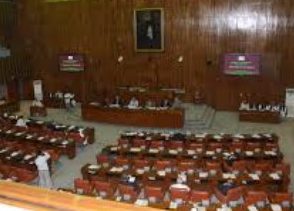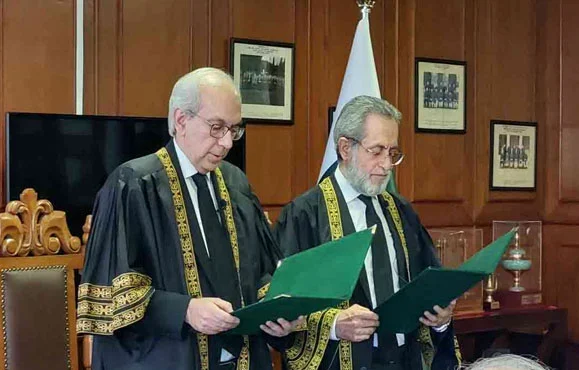
Approval of the 26th Constitutional Amendment by the Senate with Two-Thirds Majority
- Pakistan News
- October 20, 2024
- No Comment
The Senate has approved the 26th Constitutional Amendment with a two-thirds majority, granting separate approval to all 22 clauses included in the amendment.
Details of the Amendment Process:
1. **Presentation:** Federal Minister for Law Azam Nazeer Tarar presented the 26th Constitutional Amendment in the upper house and then introduced a motion for voting, which was passed by a two-thirds majority with 65 members voting in favor.
2. **Absence of Opposition Members:** Members of the Pakistan Tehreek-e-Insaf (PTI) and the Majlis Wahdat-e-Muslimeen (MWM) did not participate in the voting and exited the hall.
3. **Clause-Wise Approval:** The Chairman of the Senate ordered the closure of all doors and initiated the clause-wise approval process. The first clause received approval from 65 members, while 4 voted against it. During this process, Senator Kamran Murtaza from the Jamiat Ulema-e-Islam presented amendments, which were supported by Minister Azam Nazeer Tarar and approved by majority vote.
4. **Amendment to Article 38:** The Jamiat Ulema-e-Islam proposed an amendment to paragraph (f) of Article 38, emphasizing the urgent abolition of the interest-based system. The house approved this amendment with 65 votes in favor and none against.
5. **Amendment to Article 48:** A proposal was made in the Senate that no institution, tribunal, or authority can take action on any advice sent to the President by the Prime Minister and the Cabinet. The Senate approved this amendment by majority vote.
6. **Inclusion of Judicial Bodies in Article 81:** The Senate also approved amendments to Article 81, incorporating the Judicial Commission of Pakistan and the Supreme Judicial Council.
7. **Judicial Amendments in Article 175-A:** The Senate approved amendments to Article 175-A, establishing a commission for the appointment of judges of the Supreme Court and High Courts, consisting of 13 members, with the Chief Justice of Pakistan serving as the head.
8. **Commission Composition:** The commission will include four senior-most judges of the Supreme Court, the Federal Minister for Law, the Attorney General, senior lawyers from the Pakistan Bar Council, and two members from the National Assembly and the Senate, nominated by the government and opposition leaders.
9. **Special Parliamentary Committee:** Under the new amendment, a special parliamentary committee will be formed with 12 members, consisting of 8 from the National Assembly and 4 from the Senate. In case the National Assembly is dissolved, all members will come from the Senate.
10. **Judicial Performance Evaluation:** The Supreme Judicial Commission will evaluate the annual performance of High Court judges. If a judge’s performance is deemed unsatisfactory, the commission will issue a timeframe for improvement. If performance remains unsatisfactory after the timeframe, a report will be sent to the Supreme Judicial Council.
11. **Appointment Procedures:** The Chief Justice will be required to submit a seniority list 14 days before retirement, and the Chief Justice of Pakistan will send the names of senior-most judges to the special parliamentary committee. The committee will choose one name to send to the Prime Minister, who will then send the nomination to the President.
12. **Judges with Dual Nationality:** The amendment stipulates that no person with dual nationality can become a judge of the Supreme Court. Furthermore, a person must have served as a judge in a High Court for 5 years and practiced law for 15 years to be eligible for the Supreme Court judgeship.
13. **Retirement Age for Chief Justice:** The appointment of the Chief Justice of Pakistan will be for three years, and the Chief Justice will retire at the age of 65.
14. **Abolition of Suo Moto Authority:** An amendment to Article 184 has been made, abolishing the Supreme Court’s suo moto powers. The court will no longer be able to issue decisions or directives outside the scope of filed petitions.
15. **Fees for Appeals to the Supreme Court:** The Senate approved an increase in the fee for filing an appeal against High Court decisions in the Supreme Court from 50,000 to 1 million rupees.
16. **Constitutional Bench Formation:** The amendment includes the formation of constitutional benches in the Supreme Court, allowing for more than one constitutional bench to be established, with equal representation from all provinces.
17. **Provisions for Parliamentary Oversight:** The amendment also provides mechanisms for the Parliamentary Committee to oversee the appointment and performance of judges, ensuring transparency and accountability.
This comprehensive amendment process marks a significant step toward enhancing the independence and effectiveness of the judiciary in Pakistan.







